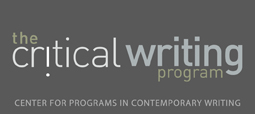Sociology
An Overview of the Discipline
As Professor Annette Lareau states, "Sociology is the behavior of individuals and the impact of membership in a social group on individual behavior." Sociology includes a wide range of sub-disciplines and areas of interest because "the study of society" is so enormously broad. However, some of the overarching topics that sociologists study are social phenomena (i.e., the family) and the way it interacts with culture, society and individual, as well as the structure of intuitions, social movements, and inequality. In addition, most sociologists can be split up into two different camps: quantitative or qualitative. Quantitative sociologists rely on data-based evidence, such as surveys, while qualitative sociologists rely on ethnographic evidence.
Writing in the Discipline
Reasoning
Reasoning is usually explanatory, but sociologists use evidence to persuade the reader to support their argument. Sociologists might also present disconfirming evidence in their writing, but these should not overshadow the main argument.
Evidence
Both qualitative and quantitative data are considered valid evidence in sociology. Evidence that can be observed, such as ethnographic research, in-depth interviews, and participant observation all constitute forms of evidence in the field of sociology. Sociologists who research historical sociology may also rely on diaries and journals, historical documents and newspapers. In addition, quantitative evidence, such as large-scale survey collection and aggregated statistical data, is considered legitimate and valuable in sociology. Some sociologists use predominately quantitative or qualitative evidence; however, even those who adhere to one usually still understand the benefits of the others.
Authorship
Depending on the sub-discipline, sociologists can either be collaborative or diffuse and individualistic. For instance, Professor David Grazian stated that while he is more individualistic and tends to publish work on his own, some sociologists only work on teams, conducting studies in extraordinarily large groups. Professor Lareau explains that usually quantitative sociology is more collaborative, whereas qualitative sociology, which involves ethnography and interviews, tends to be more individualistic.
Goal
Once again, various sociologists have various goals when conducting research. For instance, some sociologists' work is very theoretical, in which they argue against other dominant social theories. However, probably most common is a problem definition and solution approach. Sociologists define a problem, conduct research, and then either offer a solution or recommend further studies.
Writing Tips
Important Criteria for Student Writing
Reasoning and evidence is always the most important aspect of writing in sociology. However, both Professor Lareau and Professor Grazian stress the importance of strong grammar & mechanics, stating that if grammar & mechanics is clearly lacking, the student will not receive an "A." Professor Grazian also states that style is extraordinarly important, and "as important as demonstrating content knowledge" because the "best students tend to write well." While having original ideas may not be vital as a student writer, one should be able to synthesize many different materials together, which demonstrates mastery of material. Both professors said that following the discipline's citation practices were probably the least important when grading a student's paper; a student must cite, but he or she can use any citation practice as long as it is legitimate and consistent. Finally, following the assignment's instructions, organizing reasoning effectively, and using proper formatting are also all very important for a student writer's success.
Common Errors
- Summarizing, not analyzing - Unless a prompt specifically states to summarize the readings in a class, student writers should always analyze, draw connections, and form a clear and persuasive argument.
- Taking an unsupportable position - Professor Lareau states that a common error for student writers is that they become determined to take a position not supported by evidence. Students should not form an argument before they consider the evidence; the evidence should always form their argument.
- Using the passive voice - Student writers should eliminate using the passive voice whenever possible. When revising their paper, they should cut out every "to be" verb, and make the sentence active. Professor Grazian stresses there is no reason for students to use the passive voice when writing in sociology.
- Not polishing the paper - As Professor Grazian says, when people go out on a date, they consider it an obligation to take the time to shower and get ready. Even if they're busy, they take the time out of their schedule to get ready and prepare; in the same way, student writers should consider it an obligation to edit and polish their writing before turning it in. They must learn to just build it into their schedule.
Style
Style in sociology often differs depending on the type of evidence used. Professor Grazian states, "When you are writing a scientific article, you want to be parsimonious, but when you are writing about ethnographic research, you want it to be expressive." Professor Grazian stresses that it is particularly important for ethnographic researchers, such as himself, to achieve a balance between brevity and expressiveness. However, student writers should not attempt to use more complicated words than are necessary because they often use the words wrong and it makes them look pretentious.
Student writers should always write concisely and clearly in sociology. The evidence must always speak first; expression and sophisticated languages comes after mastery of the argument and reasoning.
Genres
Student Writing Assignments
- Literature/critical review
- explanatory, synthesis, evaluative
- Application or testing of a sociological theory or concept
- explanatory and justificatory
- Research paper
- Explanatory, synthesis, justificatory
Books on Writing in the Field
Writing Ethnographic FieldnotesWriting for Social Scientists
Takes of the Field: On Writing Ethnography
© 2013-2014 The University of Pennsylvania
Meet the Professors

David Grazian
"Sociological writing is a puzzle, in which you give them a sense of where you're going to wind up and then..." More...

Annette Lareau
"Students must take a stand. Having an argument (and marshaling evidence to support it) is the most important factor in writing." More...
